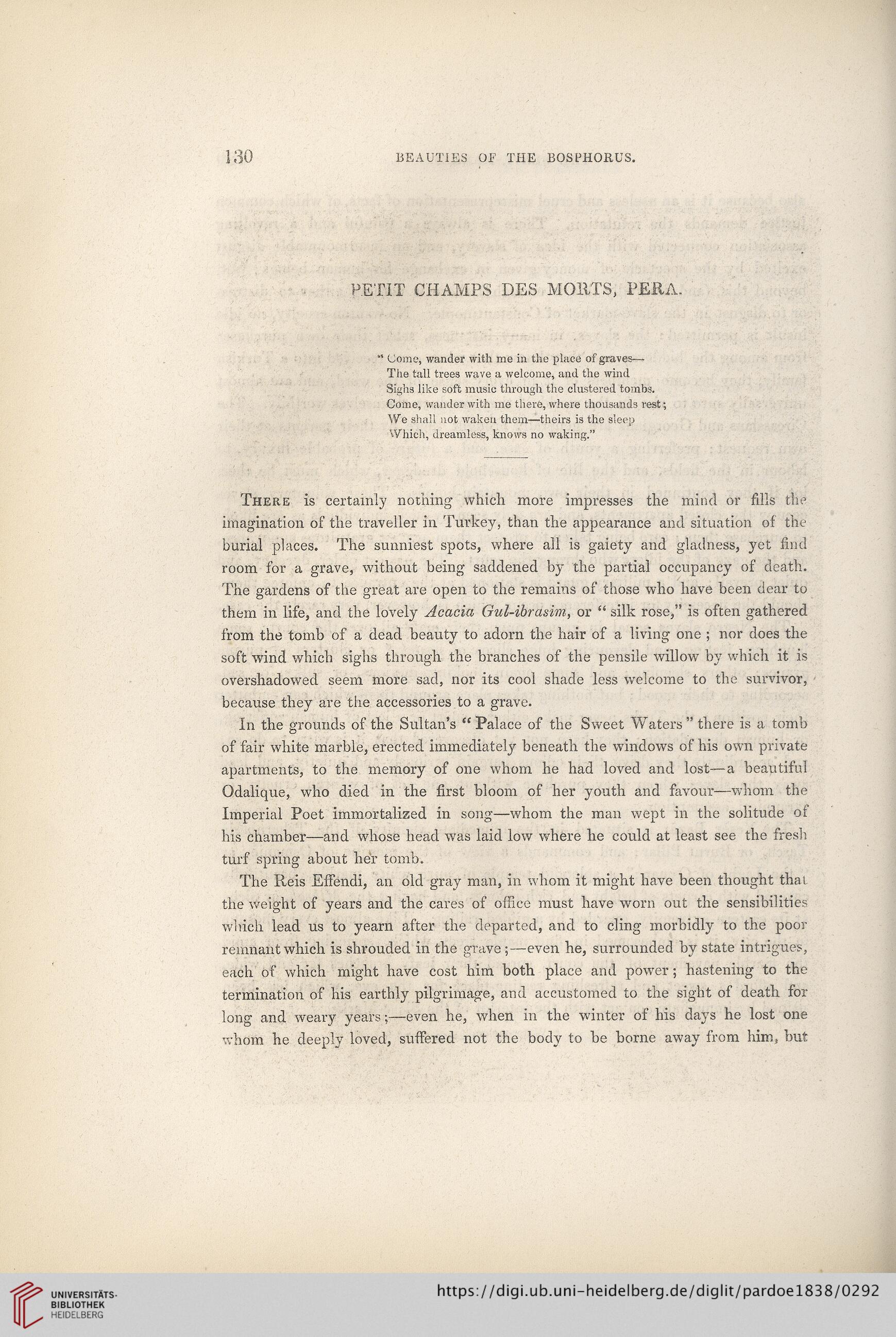130
BEAUTIES OF THE BOSPHORUS.
PETIT CHAMPS DES MORTS, PERA.
" Come, wander with me in the place of graves-
The tall trees wave a welcome, and the wind
Sighs like soft music through the clustered tombs.
Come, wander with me there, where thousands rest;
We shall not waken them—theirs is the sleep
Which., dreamless, knows no waking."
There is certainly nothing which more impresses the mind or fills the
imagination of the traveller in Turkey, than the appearance and situation of the
burial places. The sunniest spots, where all is gaiety and gladness, yet find
room for a grave, without being saddened by the partial occupancy of death.
The gardens of the great are open to the remains of those who have been dear to
them in life, and the lovely Acacia Gul-ibrasim, or " silk rose," is often gathered
from the tomb of a dead beauty to adorn the hair of a living one ; nor does the
soft wind which sighs through the branches of the pensile willow by which it is
overshadowed seem more sad, nor its cool shade less welcome to the survivor,
because they are the accessories to a grave.
In the grounds of the Sultan's " Palace of the Sweet Waters " there is a tomb
of fair white marble, erected immediately beneath the windows of his own private
apartments, to the memory of one whom he had loved and lost—a beautiful
Odalique, who died in the first bloom of her youth and favour—whom the
Imperial Poet immortalized in song—whom the man wept in the solitude of
his chamber—and whose head was laid low where he could at least see the fresh
turf spring about her tomb.
The Reis Effendi, an old gray man, in whom it might have been thought that
the weight of years and the cares of office must have worn out the sensibilities
which lead us to yearn after the departed, and to cling morbidly to the poor
remnant which is shrouded in the grave ;—even he, surrounded by state intrigues,
each of which might have cost him both place and power; hastening to the
termination of his earthly pilgrimage, and accustomed to the sight of death for
long and weary years ;—even he, when in the winter of his days he lost one
whom he deeply loved, suffered not the body to be borne away from him, but
BEAUTIES OF THE BOSPHORUS.
PETIT CHAMPS DES MORTS, PERA.
" Come, wander with me in the place of graves-
The tall trees wave a welcome, and the wind
Sighs like soft music through the clustered tombs.
Come, wander with me there, where thousands rest;
We shall not waken them—theirs is the sleep
Which., dreamless, knows no waking."
There is certainly nothing which more impresses the mind or fills the
imagination of the traveller in Turkey, than the appearance and situation of the
burial places. The sunniest spots, where all is gaiety and gladness, yet find
room for a grave, without being saddened by the partial occupancy of death.
The gardens of the great are open to the remains of those who have been dear to
them in life, and the lovely Acacia Gul-ibrasim, or " silk rose," is often gathered
from the tomb of a dead beauty to adorn the hair of a living one ; nor does the
soft wind which sighs through the branches of the pensile willow by which it is
overshadowed seem more sad, nor its cool shade less welcome to the survivor,
because they are the accessories to a grave.
In the grounds of the Sultan's " Palace of the Sweet Waters " there is a tomb
of fair white marble, erected immediately beneath the windows of his own private
apartments, to the memory of one whom he had loved and lost—a beautiful
Odalique, who died in the first bloom of her youth and favour—whom the
Imperial Poet immortalized in song—whom the man wept in the solitude of
his chamber—and whose head was laid low where he could at least see the fresh
turf spring about her tomb.
The Reis Effendi, an old gray man, in whom it might have been thought that
the weight of years and the cares of office must have worn out the sensibilities
which lead us to yearn after the departed, and to cling morbidly to the poor
remnant which is shrouded in the grave ;—even he, surrounded by state intrigues,
each of which might have cost him both place and power; hastening to the
termination of his earthly pilgrimage, and accustomed to the sight of death for
long and weary years ;—even he, when in the winter of his days he lost one
whom he deeply loved, suffered not the body to be borne away from him, but




